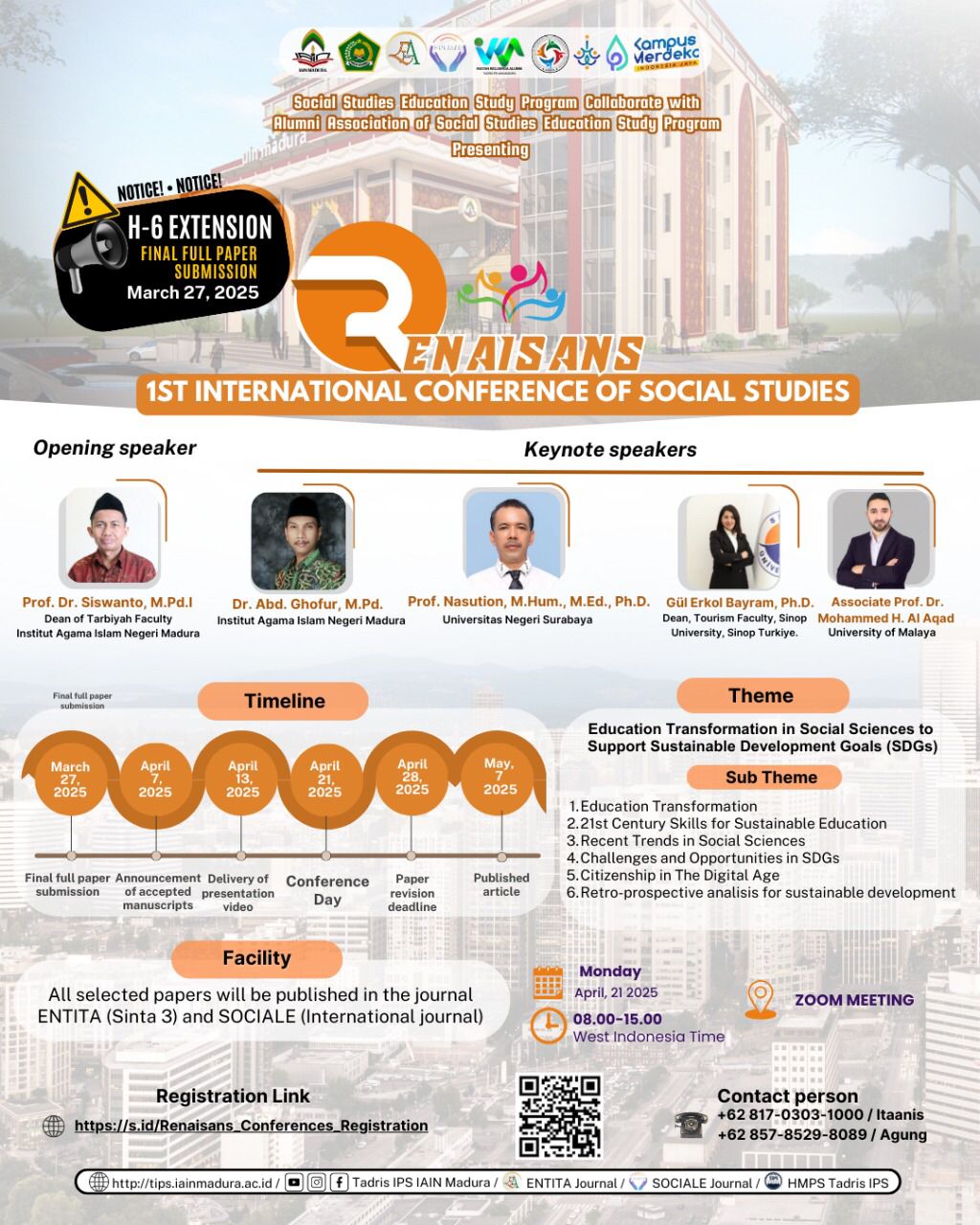Labour-Intensive Program: A Transformation of Public Welfare Policy in Supporting Sustainable Development
 Abstract views: 8
,
Abstract views: 8
,
 PDF downloads: 12
PDF downloads: 12
Abstract
The Labour-Intensive Program is a policy of the Surabaya City Government that is oriented towards empowering human resources and developing public welfare for low-income communities in the City of Surabaya after the COVID-19 pandemic. This research aims to describe; 1) the transformation of the Surabaya City Government's public policy from a social welfare orientation to a labor-intensive policy after changes in the implementation of PERWALI No. 35 of 2022 concerning Amendments to the Surabaya Mayor's Regulation Number 9 of 2022 concerning Social Rehabilitation of Uninhabitable Houses in the City of Surabaya; and 2) the implementation of the labor-intensive program policy. This research method is a qualitative-descriptive research with data collection techniques through literature studies, observations and in-depth interviews with policy implementers (Public Housing & Human Settlements Office) in the Dupak Village area, Krembangan District. This study produces several conclusions: 1) changes in the implementation of PERWALI NO. 35 of 2022 concerning Amendments to the Regulation of the Mayor of Surabaya Number 9 of 2022 concerning Social Rehabilitation of Uninhabitable Houses in the City of Surabaya, is the interest of the policy actor (Mayor of Surabaya) as a consequence of the shift in the policy paradigm from a social welfare-based program to a labor-intensive program. 2) The implementation of labour-intensive policies aims for public welfare in reducing poverty and unemployment, and national economic recovery in order to support sustainable development goals.
Downloads
References
Anggraini, B. L., & Kurniawan, B. (2021). Evaluasi Program Rehabilitasi Rumah Tidak Layak Huni (Rtlh) Di Kabupaten Tuban. Publika, 309–322. https://doi.org/10.26740/publika.v9n2.p309-322
Aqila, C., Ismail, H., & Wahyudi, E. (2022). Efektivitas Kinerja Pelayanan Kelurahan Wonokusumo Terhadap Program Padat Karya Dispendukcapil Surabaya. PRAJA Observer: Jurnal Penelitian Administrasi Publik, 2(04), 48–59.
Bhangu, S., Provost, F., & Caduff, C. (2023). Introduction to qualitative research methods - Part i. Perspectives in Clinical Research, 14(1), 39–42. https://doi.org/10.4103/picr.picr_253_22
BPS. (2024). Profil Kemiskinan di Provinsi Riau Maret 2024. Berita Resmi Statistik, 36, 1–16.
Fadhilah, A., & Wahyudi, K. E. (2023). Pemberdayaan Masyarakat Berpenghasilan Rendah (MBR) Melalui Program Rumah Padat Karya Dukuh Sutorejo. NeoRespublica: Jurnal Ilmu Pemerintahan, 5(1), 198–210. https://neorespublica.uho.ac.id/index.php/journal/article/view/112
Fatihah, S. A., & Azizah, N. (2024). Pemberdayaan Masyarakat Pada Keluarga Miskin dan Pra Miskin. Economics And Business Management Journal ( EBMJ ) Juni, 3(2), 678–683.
Giani, M. N., Darmawan, A., & Hariyoko, Y. (2021). Partisipasi Masyarakat Dalam Program Padat Karya Surabaya Di Kecamatan Tenggilis Mejoyo. PRAJA Observer: Jurnal Penelitian Administrasi Publik, 1(1), 51–58.
Hadi, A. K., Musa, R., & Sadar, A. R. N. R. (2022). Manfaat Program Padat Karya Revitalisasi Drainase di Waktu Covid-19. Jurnal Flyover, 2(1), 39–47. https://doi.org/10.52103/jfo.v2i1.870
Hapsari, F. W., & Arif, L. (2023). Pemberdayaan Masyarakat Miskin Melalui Program Rumah Padat Karya. Societas: Jurnal Ilmu Administrasi Dan Sosial, 12(2), 316–325. http://ejournal.unmus.ac.id/index.php/societas
Hiebert, J., Cai, J., Hwang, S., Morris, A. K., & Hohensee, C. (2023). How Do You Formulate (Important) Hypotheses? https://doi.org/10.1007/978-3-031-19078-0_2
Lafina, A. R., Sholichah, N., Wardhono, H., & Widyawati. (2023). Implementasi Program Padat Karya Bagi Masyarakat Berpenghasilan Rendah (MBR) Dalam Perspektif Collaborative Governance di Kelurahan Manyar Sabrangan Kota Surabaya. Jurnal Ilmiah Manajemen Publik Dan Kebijakan Sosial, 7(2), 158–172. https://doi.org/10.25139/jmnegara.v7i2.6992
LaMarre, A., & Chamberlain, K. (2022). Innovating qualitative research methods: Proposals and possibilities. Methods in Psychology, 6(November 2021), 100083. https://doi.org/10.1016/j.metip.2021.100083
Mayasari, O. S. (2023). Politik Hukum Pengalokasian Program Padat Karya Dengan Menggunakan Anggaran Pendapatan dan Belanja Daerah di Kota Surabaya. Jurnal Mengkaji Indonesia, 2(1), 216–247. https://doi.org/10.59066/jmi.v2i1.426
McMullin, C. (2023). Transcription and Qualitative Methods: Implications for Third Sector Research. Voluntas, 34(1), 140–153. https://doi.org/10.1007/s11266-021-00400-3
Morgan, H. (2022). Conducting a Qualitative Document Analysis. Qualitative Report, 27(1), 64–77. https://doi.org/10.46743/2160-3715/2022.5044
Putri, G. F. P., & Ismail, H. (2024). Analisis Stakeholder pada Pelaksanaan Program Padat Karya dalam Mengentaskan Kemiskinan di Kelurahan Medokan Semampir. Praja Observer: Jurnal Penelitian Administrasi Publik, 4(1), 37–48.
Putricia, A. M., & Prathama, A. (2023). Pemberdayaan Masyarakat Melalui Program Rumah Padat Karya Viaduct by Gubeng di Kota Surabaya. NeoRespublica: Jurnal Ilmu Pemerintahan, 5(1), 95–110. http://neorespublica.uho.ac.id/index.php/journal/article/view/114
Sari, S. N., Widiyanto, M. K., & Rahmadanik, D. (2024). Efektivitas Pemberdayaan Masyarakat Melalui Program Rumah Tidak Layak Huni ( RUTILAHU ) di Kota Surabaya Guna Meningkatkan Kesejateraan Masyarakat. JRP: Jurnal Relasi Publik, 2(3), 310–321.
Setiawan, A. C. (2023). Berita Resmi Statistik: Profil Kemiskinan di Kota Surabaya Maret 2023. Badan Pusat Statistik Kota Surabaya, 11, 1–8. http://surabayakota.bps.go.id
Vila-Henninger, L., Dupuy, C., Van Ingelgom, V., Caprioli, M., Teuber, F., Pennetreau, D., Bussi, M., & Le Gall, C. (2024). Abductive Coding: Theory Building and Qualitative (Re)Analysis. Sociological Methods and Research, 53(2), 968–1001. https://doi.org/10.1177/00491241211067508
Widiyantara, G. (2023). Perkembangan Ekonomi Indonesia Pasca Pandemi Covid-19. Journal Intelektual, 2(2), 136–140. https://doi.org/10.61635/jin.v2i2.156
Yadav, D. (2022). Criteria for Good Qualitative Research: A Comprehensive Review. Asia-Pacific Education Researcher, 31(6), 679–689. https://doi.org/10.1007/s40299-021-00619-0
https://www.djkn.kemenkeu.go.id/kpknl-banjarmasin/baca-artikel/14769/Pemulihan-Perekonomian-Indonesia-Setelah-Kontraksi-Akibat-Pandemi-Covid-19.html. Accessed on April, 20 2025
https://surabaya.go.id/id/berita/23500/ekonomi-surabaya-tumbuh-melesat-5-76-persen-tertinggi-di-jatim-kemiskinan-ikut-turun. Accessed on April, 20 2025.
Copyright (c) 2025 Entita: Jurnal Pendidikan Ilmu Pengetahuan Sosial dan Ilmu-Ilmu Sosial

This work is licensed under a Creative Commons Attribution-NonCommercial 4.0 International License.
ENTITA: Jurnal Pendidikan Ilmu Pengetahuan Sosial dan Ilmu-Ilmu Sosial operates an Open Access policy under a Creative Commons Non-Commercial 4.0 International license. Authors who publish with this journal agree to the following terms:
- The copyright of the received article once accepted for publication shall be assigned to the journal as the publisher with licensed under a

- Journal is able to enter into separate, additional contractual arrangements for the non-exclusive distribution of the journal's published version of the work (e.g., post it to an institutional repository or publish it in a book), with an acknowledgement of its initial publication in this journal.
- Journal is permitted and encouraged to post their work online (e.g., in institutional repositories or on their website) prior to and during the submission process, as it can lead to productive exchanges, as well as earlier and greater citation of published work (see The Effect of Open Access).
- Here is Copyright Transfer Form that author can download and send to OJS during submission.

















